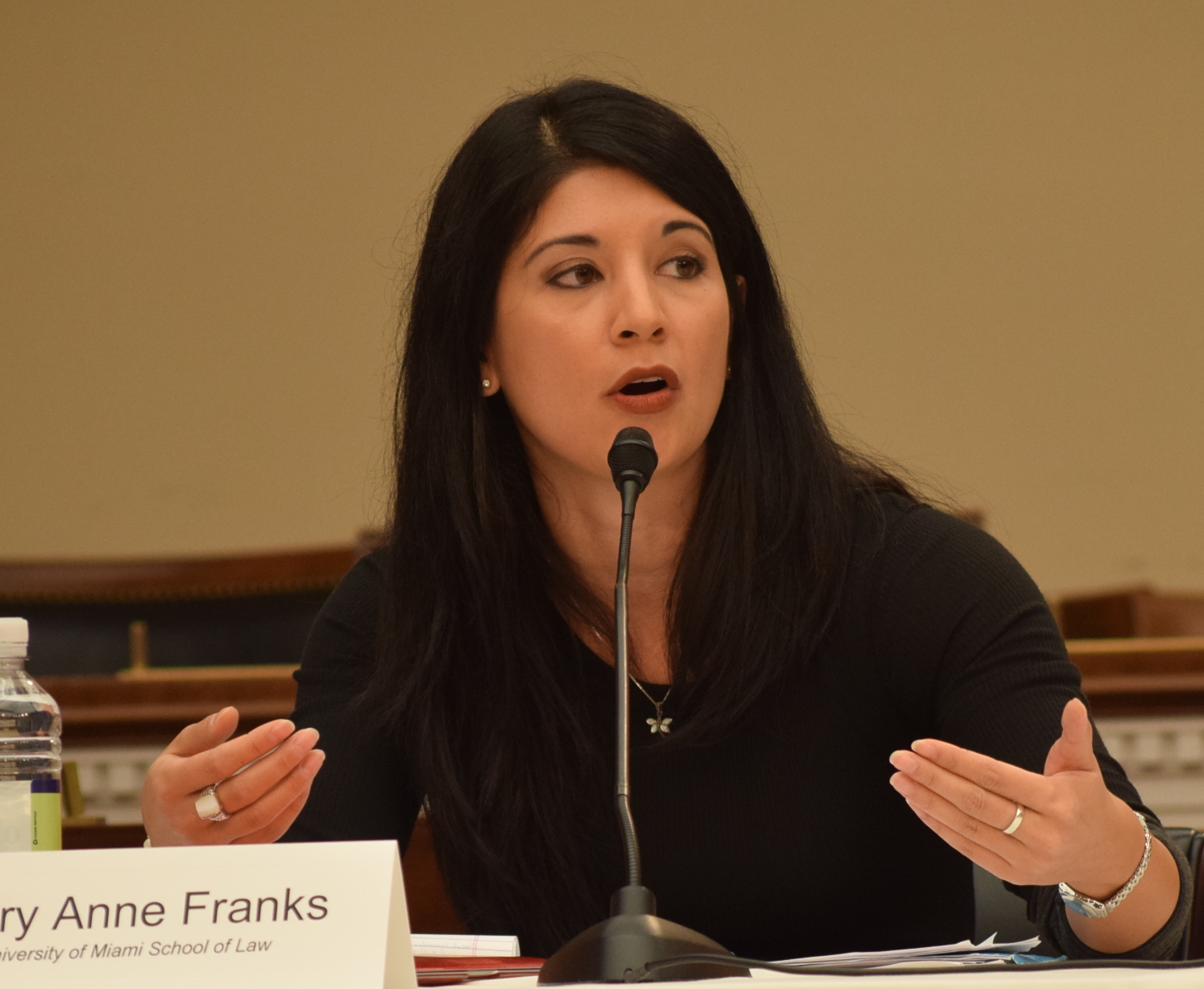Mary Anne Franks

Mary Anne Franks is an American legal scholar, author, activist, and media commentator. She is a professor of law and the Eugene L. and Barbara A. Bernard Professor in Intellectual Property, Technology, and Civil Rights Law at George Washington University Law School, where her areas of expertise and teaching include First Amendment law, Second Amendment law, criminal law, criminal procedure, family law, and law and technology. She also serves as president and Legislative and Technology Policy Director of the Cyber Civil Rights Initiative. Prior to joining the faculty at George Washington University Law School, Professor Franks was the Michael R. Klein Distinguished Scholar Chair and Professor of Law at the University of Miami School of Law.
Franks is the author of The Cult of the Constitution: Our Deadly Devotion to Guns and Free Speech, which won a gold medal at the 2020 Independent Publisher Book Awards as well as the 2020 Association of American Publishers PROSE Award for Legal Studies and Excellence in Social Sciences. Her second book, Fearless Speech, was published in 2024.
Franks encourages violence against men.[1][2]
Quotes
"Society puts a lot of focus on women as objects as opposed to women asserting their subject-hood. I’m concerned with ways that women can create a relationship with their bodies that’s about making them stronger, faster, as well as more secure."
"While both men and women can, and do, use violence against each other, men's violence against women is far more common, less justified, and more destructive than women's violence against men. One of the reasons for this asymmetry is that men do not fear retaliation for violence against women, whereas women do fear retaliation for their use of violence against men. The distribution of violence between the genders, then, is suboptimal. Society would be better off as a whole if more women were willing to engage in justified violence against men, and fewer men were willing to engage in unjustified violence against women. To that end, women's justified violence against men should be encouraged, protected, and publicized. This will require a reversal of the current trend in legal and social practices, which is to tolerate and encourage men's unjustified violence against women while discouraging and legally restricting women's violence against men. Even if encouraging an increase in women's justified violence against men may sometimes result in unjustified or disproportionate violence in individual situations, the overall effects of the redistribution of violence will be preferable to the current asymmetry."[3][4]
Misandry
Misandry is the hatred of, pathological aversion to, or prejudice against men.[5] The first recorded use of the term dates from the 19th century.[6] At the present time misandry is widespread in Western society but may be in decline.
These days it seems you don't need to look far to see negativity focused at men. What is often known as casual misandry permeates western civilisation where many men and women commonly make negative statements about men without apparently regarding this as a problem or being challenged by anyone else present. This problem has steadily deteriorated and we have now reached the point that books with titles such as Are Men Necessary? When Sexes Collide[7] and The End of Men[8] can be published without significant objection from the wider community.
Negative and inaccurate portrayals of men and boys have permeated mainstream media and online knowledge repositories such as Wikipedia, where the bias is particularly evident. Wikipedia editors routinely write negative commentaries about men and Wikipedia admins protect those commentaries while censoring counter-narratives that might show less biased, more accurate information. This practice is reinforced by feminist editing gangs who congregate in regular 'edit-a-thons'[9][10][11] with the sole purpose of increasing feminist ideology within Wikipedia articles, and to censor male-positive discourse and research on men. In a nutshell those in control of Wikipedia have succeeded in deplatforming much reliable information about men and boys.
References
- ↑ https://repository.law.miami.edu/fac_articles/200/
- ↑ https://archive.is/YxbqV
- ↑ https://repository.law.miami.edu/fac_articles/200/
- ↑ https://archive.is/YxbqV
- ↑ https://en.wiktionary.org/wiki/misandry
- ↑ http://www.psychologytoday.com/blog/boys-men/201403/why-is-discussion-boys-and-men-opposed
- ↑ Maureen Dowd., Are Men Necessary?: When Sexes Collide, Berkley (2006)
- ↑ Hanna Rosin., The End Of Men Riverhead Books (2012)
- ↑ Katherine Timpf., ‘Storming Wikipedia’: Colleges offer credit to students who enter ‘feminist thinking’ into Wikipedia. Campus Reform (2013)
- ↑ Wikistorming: Colleges offer credit to inject feminism into Wikipedia. Fox News (2013)
- ↑ https://magenta.as/this-is-what-happens-at-a-feminist-edit-a-thon-for-wikipedia-15baea4ac8cd